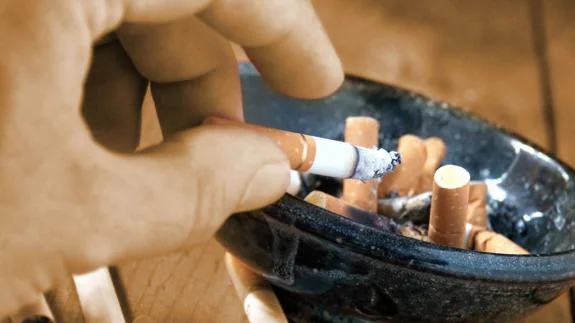

Secciones
Servicios
Destacamos

Ángel Escalera
Thursday, 2 July 2020, 18:35
Tobacco is like a very effective spider's web: it traps those who fall into its net and doesn't let them go. It is the addictive power of nicotine that makes it so hard to stop smoking, especially in exceptional situations such as the ... one we have just experienced with the coronavirus lockdown.
A survey into tobacco consumption which was carried out by the online platform Top Doctors, which provides information about the best medical specialists in the private health sector, shows that as many as 40 per cent of those who took part said they had smoked more since the pandemic began and the state of alarm came into force and obliged them to stay at home. Those who admit to being habitual smokers said they had been smoking twice as much as usual.
The head of the tobacco addiction unit at the provincial branch of the Spanish Association against Cancer (AECC), Salvador de Oña, explains that, although there has been no specific study into tobacco consumption during lockdown, it has been shown that when people have to convalesce and be immobilised in their homes for long periods after surgery, they tend to smoke more. These smokers use tobacco as a sedative and to combat the boredom of not being able to leave their homes.
Dr de Oña believes something similar occurred during the weeks of confinement. "Being shut in has a negative repercusssion, because it causes feelings of anxiety, stress and anguish. To combat those sensations, people increase the amount of cigarettes they smoke," says this doctor, who specialises in treatments to help people overcome their dependence on tobacco.
Dr de Oña says that former smokers who have had support from their families during the lockdown have found it easier to resist the temptation to start smoking again. Many of those without that social and family support have gone back to their old ways.
Dr de Oña also refutes the claim that smoking can have a protective effect against the coronavirus. On the contrary, he says, it has been confirmed that people who smoke are at greater risk of developing serious complications and even dying.
With regard to whether exhaled tobacco smoke could be a source of infection because the droplets could contain SARS-CoV-2, he doesn't believe this is the case and says that studies carried out into flu viruses have found no causal relationship between exhaled smoke and the spread of the illness.
Smokers in Malaga
In Malaga province 31.4 per cent of men and 24.6 per cent of women smoke, says Dr de Oña. The age range of 45 to 54 has the highest concentration of smokers. To reduce the numbers, he says more policies are needed to increase smoke-free zones. He also points out that there are some bar terraces where people should not be allowed to smoke, because they are not complying with the conditions set down by law.
"To cut the problem off at the root, the price of packs of cigarettes and loose tobacco needs to be increased. That is the most effective way of ensuring that young people don't fall into the dangerous habit of smoking," he insists. "Raising the price of tobacco would be the most important method of stopping them getting into the habit of smoking as part of their daily routine."
With regard to the popular belief that loose tobacco is healthier because it contains fewer additives, this expert says that is completely incorrect because it actually accumulates more nicotine, tar and carbon monoxide.
"Under equal conditions, rolling tobacco is actually more dangerous than the manufactured version," he says. "No tobacco in existence is good for the health."
Publicidad
Publicidad
Publicidad
Publicidad
Esta funcionalidad es exclusiva para suscriptores.
Reporta un error en esta noticia
Comentar es una ventaja exclusiva para registrados
¿Ya eres registrado?
Inicia sesiónNecesitas ser suscriptor para poder votar.